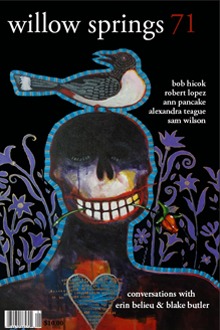
About Ann Pancake
A native of West Virginia, Ann Pancake is the author of a short story collection, Given Ground, winner of the 2000 Bakeless Fiction Prize, and last year’s novel, Strange As This Weather Has Been (2007), which, according to Rick Bass, “crackles with this century’s great white background noise of loss, greed and dishonesty.” Pinckney Benedict refers to Pancake as a writer “who sees with a lover’s generous heart, with a prophet’s steel-hard gaze.” Pancake’s rhythmic prose creates what she calls “background music” to her stories. Rooted in her Appalachian heritage, her fiction weaves precise language with vivid attention to place and complexity of character.
Ann Pancake graduated summa cum laude from West Virginia University, obtained her MA in English from the University of North Carolina, and earned a PhD in English from the University of Washington. She has taught in Japan, American Samoa, and Thailand, and her numerous publishing credits include The Virginia Quarterly Review, Shenandoah, Glimmer Train, Antietam Review, Quarterly West, and New Stories From the South. She’s been awarded a Tennessee Williams Scholarship in Fiction, a Thomas Wolfe Fiction Prize, a National Endowment for the Arts Creative Writers’ Fellowship Grant, the 2003 Whiting Award, the Glasgow Prize, and fellowships from the states of West Virginia, Pennsylvania, and Washington.
A Profile of the Author
Notes on “Our Own Kind”
I am primarily a fiction writer, so when I heard so strongly the first lines of an essay instead, I was surprised. Once I imaginatively placed myself in this frigid winter landscape right around the house where I grew up, the early drafts came fairly easily. I had a terrible time with the ending, but that’s typical of my work. I returned to the draft off and on for years, hoping that an ending would come intuitively, but it never did. I cobbled together this one with some advice from a very wise friend, and I think it’s passable, but I’m still not satisfied with it. What was hardest for me to understand was the relationship between the meditations on the natural world and those on gender.
As I wrote, I worried constantly about my brother’s reaction to this piece. I knew I couldn’t publish it without his okay, and because I was scared to show it to him, I contemplated not publishing it at all. Fortunately for me, even though it was a very emotional read for him, Sam generously gave it his blessing.
Notes on Reading
My writing usually comes to me by ear, so I am nourished by reading language-driven fiction and nonfiction. I am increasingly disappointed by the bulk of novels and short stories put out by commercial presses, who run for their lives when they see music or inventiveness in prose because they assume that makes the writing less accessible, thus less saleable. Fiction without music, in my opinion, is crippled fiction, art trying to function in two dimensions when three or more are available to it. I find myself searching for lesser-known presses and authors in hopes of finding the fuel I need for my own writing. Poetry helps, and I return again and again to older works, especially the Modernists or those influenced by Modernism. Faulkner, Jean Rhys, and Marguerite Duras are stalwarts, as are Toni Morrison, James Agee, Jayne Anne Phillips, Breece Pancake, Keri Hulme, and early Cormac McCarthy. The best contemporary novel I’ve read in years is Salvage the Bones by Jesmyn Ward. One of the most beautiful new ones I read before that was Jamie O’Neill’s At Swim, Two Boys.


